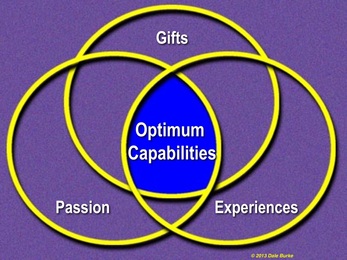This makes TJ Addington’s recent blog post very timely. Take a moment to reflect on his advice:
|
Clarity is rare these days. We are bombarded with information, our schedules are overloaded, and we can get bogged down with too many choices. This makes TJ Addington’s recent blog post very timely. Take a moment to reflect on his advice: Practices That Help Leaders See Clearly All of us want to see the issues of life clearly and this is nowhere more important than for leaders whose actions, perceptions and decisions impact teams and organizations. This does not happen automatically as the busyness of life, demands of leadership and lack of appropriate margin often cloud out clarity leaving us seeing through a clouded rather than a clear lens.
0 Comments
 As my youngest daughter launched from high school to college about ten years ago, I wrote her a letter of advice reminding her that her eternal life and impact will always flow out of the internal life of her heart, and I gave her 8 challenges. I recently cleaned out some files and came across this letter. It struck me that the same advice I gave to her, is relevant for you as you launch into this next year of ministry! So I have rewritten the letter as a charge to you for 2014: Dear Fellow Leaders, Guard your affections. Make sure your love is well placed. Jesus said it best when He said that all of life is summarized in two commands, “Love God with all your heart, soul, mind, and strength, and love your neighbor as yourself” (Matthew 22). Make sure that your first love is not your spouse, parents, work, friends, not even your own life, but your God. It is only when that love is focused that you will be able to discern how to love the other important people in your life. Listen to God and His Word and obey it carefully and you will never, never be disappointed.  *Choice 8 of 10 in the Take Back Your Life blog series Paradoxically, the urgent is seldom important, and the important is seldom urgent. In order not to get distacted by the unimportant, but urgent responsibilities, we need to learn the discipline of focus. Florence Chadwick learned this the hard way. Florence was born in 1918 and started swimming at a very young age. At age 10, she became the first person to swim the San Diego Bay channel. A few years later, she became the first woman to swim the English Channel both ways. And on July 4, 1952, she set out to swim the twenty-mile distance from Catalina Island to the coast of California. Florence got an early start that morning. Even though it was summer, the water was cold, the weather was chilly, and a heavy fog hung in the air. Part way into her journey, some curious sharks began to follow her. People in a nearby boat—including her mom—fired gunshots into the water to scare off the sharks.  *Choice 7 of 10 in the Take Back Your Life blog series In the last blog post, we learned that life is designed by God to be lived as a “team sport.” If it is a team sport, it only makes sense that you should focus the majority of your time doing what you do best. God wants you to maximize your personal gifts and abilities for the good of the team. Every believer has special and unique gifts he or she can contribute in service of others. None of us is meant to be a “do it all” generalist. Rather, each one of us has special functions that are designed to complement one another. Great lives are not built by improving weaknesses, but by maximizing strengths. You might be thinking, I’m not really sure what my gifts and passions are.  10 Choices To Get Control Of Your Life Again Are you overloaded, always busy, always trying to “catch up,” and constantly living for the weekend? If so, you’ve probably lost control of your life. Don’t mistake the prevalence of these symptoms in so many people’s lives as an indication that this is “normal.” The problem with most people’s lives today is that their lives are too fast, too complex, out of control, and overloaded. And as a result, their potential impact for the Kingdom of God is underutilized. This is not God’s design for our lives. God wants us to surrender control of our lives to him, but how can we surrender control of that which we do not possess? We need to first take back control of our lives from the circumstances, people, obligations and desires that seek to possess us. Below is a brief overview of 10 choices you can make to take back control of your life and give it to God.  God is the owner and you are the steward; we often see this principle taught in regards to money. The most common scripture referenced is the parable of the talents in Matthew 25:14-29. In this passage, Jesus teaches us that we are to be wise stewards of the money God has entrusted to us and that we don’t actually own anything. Rather, we have been given stewardship or management over God’s resources and he expects a return. But the principle of good stewardship applies to more than just money.  Email can bury you faster than quicksand. Before your day and energy are consumed at the computer, answer these questions: 1. What part of the day am I most creative and sharp? When do I do my best work? Morning or afternoon? 2. Do I usually process my email during my prime part of the day? 3. Does God want me to use my best time of day answering email? Or is there some calling more crucial that needs my best effort?  Even if you develop and implement a perfect plan to organize your schedule around Rest Time, Results Time and Response Time, the plan will not work forever. Your plan will fail at some point. Life and leadership are always changing, our responsibilities and priorities, inevitably, are going to shift. Even our unique abilities are under constant refinement, still being discovered and developed as we lead. This is why we need the 4th “R,” Refocus Time. Refocus Time is dedicated to working on the mission, not just in the mission. This time is used to assess, adjust, and innovate for the future; to make the necessary tweaks to your plan so that it continues to work for you. The main questions you want to ask yourself during Refocus Time are:  Response time is a block of time dedicated to cleanup and follow-up and this time should only occur if you already have your results and rest time scheduled and protected because these are vital to the long-term health of the entire organization. As a servant-leader you’ll need to realize that the people you serve have their own agendas and needs. One of their greatest needs is simply to know that you care – that you are there for them. As a result, response time is highly reactive.  The difference between a street fighter and a boxer is not power, but control. The boxer measures his punches and conserves his power. He thinks strategically about each and every hit. A street fighter flails and throws as many punches with as much power as he can exert at once. When you focus on your main thing and protect time to accomplish your main thing, you act more like a boxer than a street fighter. You will end up accomplishing more with less and still have energy for life at the end of the day. Last week I gave you some advice on protecting results time in your weekly schedule; half day or full day increments set aside to work on your main thing(s). But in order to do this, you need to define your main thing. Here is a definition and some questions to get you started: |
AuthorI am Dale Burke, a follower and disciple of Jesus Christ, husband, dad and grandpa, leadership consultant, senior pastor for 30+ years and a pastor to pastors. Archive
May 2014
Categories
All
|


 RSS Feed
RSS Feed
